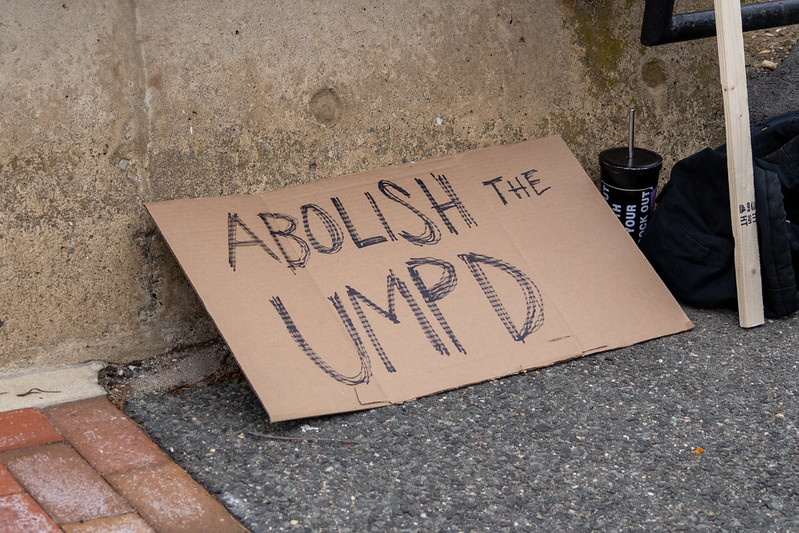We are writing to express our continued outrage about the University of Massachusetts’ response to the arrest of a student of color on Nov. 1, 2022.
Over 2,400 UMass students, staff and faculty members signed a petition last year calling for the administration and the UMass Police Department to drop all charges against the student. Instead, he was charged with assault and battery on a police officer and disorderly conduct, which will follow him forever, regardless of the outcome of the legal process currently underway.
In this incident, the UMPD could have taken many actions that did not involve arresting and charging the student. Police officers could have directed traffic to stop, rather than physically grabbing (assaulting) the student. They could have escorted the student from the area without an arrest and could have engaged with the student and officers in a restorative conversation. It should also be noted that the police never charged the student with jaywalking or another initial, minor infraction.
UMass community members organized to protest, but the administration’s response was simply to hire Margolis Healy, a consulting firm with multiple, clear connections to law enforcement, to investigate the incident. How does the UMass administration justify hiring a consulting firm, founded by two former police chiefs and run by a majority of team members with law enforcement, security and military affiliations, to investigate and questions police conduct?
On March 30, 2023, the campus was informed through an email from Brandi Hephner LaBanc, vice chancellor for student affairs and campus life, that Margolis Healy’s investigation found no wrongdoing and exonerated the UMPD of any responsibility. Despite multiple witness statements to the contrary and alternative actions available to the officers, the report also claimed that there was absolutely no evidence of racial bias or excessive force in the officers’ actions. In its recommendations to the University, Margolis Healy also recommended continued use of police trainings and pedestrian safety procedures that are already in place. These results are unsurprising and predictable given the pro-police bias of the investigating firm. How does the UMass administration justify accepting an investigative report that is so clearly inconsistent with publicly known facts and so clearly focused on exonerating individuals, rather than questioning larger structures of policing and punishment?
In addition, contrary to Massachusetts law, the administration refused to release the entire Margolis Healy report to the public. Vice Chancellor Hephner LaBanc’s email also declared that the full report is confidential, as it pertains to personnel matters. However, policing reforms in 2020 exempted investigations of police misconduct from personnel protections, explicitly making them public record. How does the UMass administration justify accepting the results of a clearly biased investigation and refusing to share them with the campus community impacted by them?
This response falls far short of what we consider necessary to address the racial trauma and pervasive communal division inflicted by this incident, in a campus climate of profound and ongoing racism and lack of belonging experienced especially by students, faculty and staff of color on campus. UMass administrators have often been outspoken in critiquing incidents beyond campus where police have violently escalated interactions involving minor infractions by Black and Brown people, including the murder of George Floyd and guilty verdict against the officer who killed him. And yet, when these incidents happen on our own campus, the administration has been silent and complicit.
Given UMass’ claims to be revolutionary and antiracist, why has no member of the UMass administration come out publicly to state that under no circumstances should a police engagement with a student for a minor pedestrian infraction lead to an arrest and criminal charges?
Given the repeated failures of police to further campus safety and community, why has no member of the UMass administration publicly questioned the decision to enforce pedestrian and vehicular traffic patterns through police coercion and violence?
Given the bias inherent in the investigation by Margolis Healy, what actions is the UMass administration taking to encourage alternatives to the punitive and policing-focused suggestions presented by Margolis Healy?
We feel that it is time to take action to authentically address the concerns we have raised and, therefore, we demand the following:
- That the University administration reject the limited purview and pro-police bias of the Margolis Healy investigation
- That the University administration reject Margolis Healy’s erroneous conclusions that there was absolutely no evidence of racial bias or excessive force, given the multiple witness reports of both
- That the University administration immediately release the full Margolis Healy report, un-redacted, apart from the student and witnesses’ names, to the UMass community
- That the University administration condemn the continual violence and oppression of Black and Brown people through institutions of policing and punishment
- That the University administration publicly acknowledge and apologize for its complicity in the criminalization of Black and Brown people through its repeated reliance on policing and punishment as a solution to community challenges
- That the University administration completely remove all police presence from campus, including UMPD, student cadets, state police, local police and militarized private security
- That the University administration develop alternative civilian response teams, building on the CRESS model being used in Amherst
- That the University administration develops and invests in transformative justice alternatives to police interventions
- That the University administration repurpose police funding to support civilian responses, physical and mental health resources and other transformative and restorative approaches to harm and conflict
The full list of community signatures can be found here. Those looking to add their name can contact the UMass Coalition for Transformative Justice at [email protected].



















